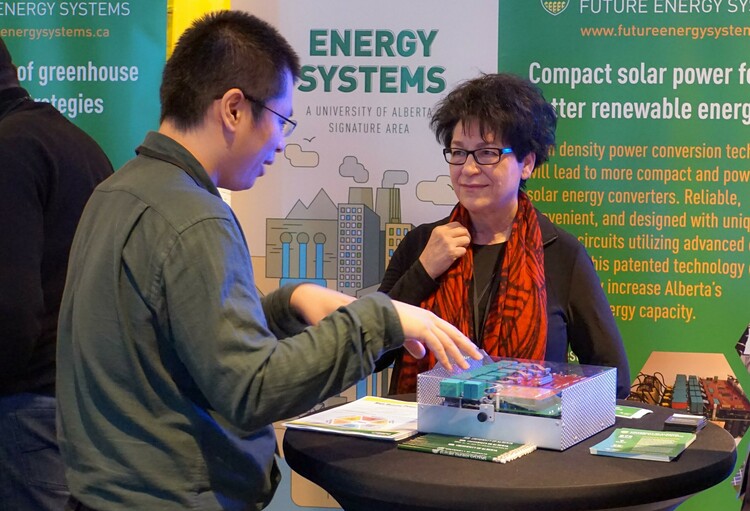Don’t oversimplify conversations about how we power our lives
M Anne Naeth - 12 March 2020

Director Anne Naeth with FES Post-Doctoral Fellow Hao Tian at the 2019 SPARK Conference.
Canada is gripped by debates about energy. Loud voices are trying to prescribe or condemn a societal energy transition based on selected facts and examples. Unfortunately, many of the conversations are incomplete.
The economic importance of oil and gas—“hydrocarbon energy”—has often been pitted against the vital environmental necessity of reducing carbon dioxide emissions. Both points are valid. Researchers working on energy systems have understood this for years.
We’ve also learned that the best technical innovations, the best economic policies, the best environmental standards developed through science can’t really be called the “best” if they only work in theory. They need to take reality into account. This hard lesson has led to an increase in “interdisciplinarity”—an academic term that simply means we build teams of experts from different fields, to tackle a problem that affects us all.
My own research is in land reclamation—how to return landscapes damaged by energy use to their natural function. Thirty years ago, I might have only worked with other land reclamation specialists. If I’d wanted to know more about the economic or social consequences of our work, I’d look up relevant articles in peer-reviewed journals. It could take years for a valuable insight from another field to find its way to my desk.
Now, I co-lead a research team made up of engineers, business scholars, economists, and environmental scientists. We meet regularly. We have strong connections in industry, government, and community groups. I don’t have to wait to find out which kind of biochar is most promising for removing contaminants from tailings water, or which policy is most likely to convince energy producers to reduce emissions, or what priorities communities have when it comes to reclaiming their land.
That’s valuable for me, and even better for our graduate students. The next generation of experts is seeing first-hand the benefits of listening to different perspectives—an insight they’ll carry with them throughout their careers. Integration is happening in all areas of research. In Future Energy Systems, the $75-million, federally funded research program I’m part of at the University of Alberta, we have anthropologists working with engineers, chemists with economists, geophysicists with sociologists, and so on. All of us work directly with government, industry, and communities of all kinds.
Building diverse teams may sound like common sense, but for centuries, academia didn’t operate this way. How did we change this mindset?
When it comes to energy, one approach was to simply change the way we talked about the problem: instead of focusing on “energy,” we talk about the “energy system.” People can define energy in many different contexts, but adding the word “system” requires us to acknowledge the complex technological, social, environmental, and economic forces that interact whenever we plug in one of our devices.
Can you store renewable energy to reliably power a hospital when the sun doesn’t shine or the wind doesn’t blow? How many people will stay in big cities if power becomes decentralized and affordable at a micro scale? What kind of smart grid would let you sell energy stored in your electric car’s batteries to the factory across town? What kinds of jobs, and how many, will be available in a green economy, and are we offering the right courses to make sure our kids can get them?
When we recognize that energy systems completely influence every aspect of our lives, it becomes more difficult to argue that we can simply change nothing at all, or everything at once. Thousands of experts therefore must work together to address the breadth of questions at play in energy transition, and we need voices from government, industry, and the public to be involved.
Ideally, that starts with everyone talking about the same thing—not limiting the discussion to which energy technology is the cheapest or has the lowest emissions, but openly talking about all the pros and cons of different approaches in different places, and the significance of each in the battle against climate change. Only when each possible change is assessed by all those metrics can we approach solutions that work for everyone.
----------------------------------------------
This article originally appeared in the Hill Times. Read it here.